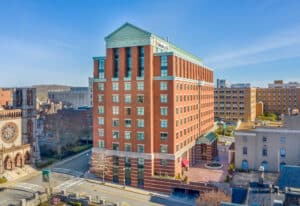Communities “outside of Boston” will share a $1 million fund to help plan for the conversion of office spaces to housing, Gov. Maura Healey announced Friday.
She announced the dollars in Worcester alongside Lt. Gov. Kim Driscoll, Housing Secretary Ed Augustus and Chrystal Kornegay, the CEO of the state’s quasi-public affordable housing finance agency MassHousing, which is providing the money for the initiative.
The fund is intended to help these small and mid-sized cities get ready for a pulse of money included in Healey’s $4.1 billion housing bond bill, which is still before the state legislature, with technical assistance that will help identify which properties in their downtowns and other commercial districts will make the best residential conversions and help lower regulatory barriers to conversions. The hope, Healey’s office said in its announcement, is to create “development-ready sites.”
The governor’s bond bill includes a $275 million fund to support new types of housing, including office-to-housing conversions, among other funds that these office-to-housing conversions might tap alongside an increase in tax credits from the Housing Development Incentive Program that Healey signed into law last year.
The announcement took place at Synergy Investments’ planned, 198-unit Chestnut Place office-to-housing conversion in downtown Worcester. Driscoll and Augustus both lauded the project as emblematic of the kinds of projects they hope the new dollars from MassHousing will lead to.
“Synergy’s Chestnut Place project is a great example of how we can use the resources we already have at our disposal to build more housing and lower costs for all,” Driscoll said in a statement. “The Commercial Conversion Initiative will help make more projects like this possible across the state.”
Synergy bought the 273,304-square-foot building last March for $10.5 million. At time of sale, brokers who represented both sides of the transaction said the 1990-vintage building was 80 percent leased to Fallon Health and other tenants.
More office-to-housing conversions will be important to make sure the state’s Gateway Cities retain vitality downtown despite the seeming permanence of work-from-home and flexible office schedules following the COVID-19 pandemic, Augustus said.
“While offices remain a vital part of our cities, they simply don’t use as much space as they once did. With the Commercial Conversion Initiative, we can fill them with people who, instead of leaving our cities at 5 o’clock, will live here, shop here and infuse our communities with energy,” he said in a statement.




 |
| 


